- Home
- David Levithan
19 Love Songs Page 5
19 Love Songs Read online
Page 5
So many gay boys—whether they know they’re gay yet or not—go through high school feeling like they’re the only ones. They think they’re the only ones who will never find love, the only ones who don’t really fit in, the only ones who aren’t coupled off. With the good girls, I was never the only one. Not in that way. I was sometimes the only boy. And I’m sure there were times when I thought it was ridiculous that the “dates” I had were fleeting at best. But because so many of my female friends were in the same boat, I didn’t really feel alone. There were no long, dark nights of the soul, because my soul was keeping pretty good company.
The girls and I flirted and bantered. Nonstop. We passed notes. Lord, we passed notes. String these notes together and you’d get the full symphony of my high school years, an almost minute-by-minute re-creation. Constant observation, reflection, honing life into prose.
Everything remained peaceable until our senior prom came along. It wasn’t a particularly big deal to me—I had already gone my junior year, the date of a girl I barely knew, who clearly had gotten to the bottom of her draft list before asking me. I’d had fun, but I’d also figured that it wasn’t actually a night that would change my life forever. Going into prom season, I was (as always) unattached, and while the question of who I would ask was hotly debated when I wasn’t in the room, when I returned to the room, I was left to my own obliviousness.
I decided to ask Jordana, a member of the junior posse of good girls. Bizarrely, I made this decision while watching her play the Mother Abbess in our high school’s production of The Sound of Music. Seriously. While she was busy exhorting Maria to climb ev’ry mountain, I was thinking, It would be fun to go to the prom with Jordana. Not as a date-date. But in lieu of a date-date.
I knew another boy, Josh, probably wanted to ask her, too. But I figured, hey, I’d give Jordana the option and see what she wanted to do. We went on a nondate to Bennigan’s, and I stalled. I pondered. I worked myself up into an existential crisis while I ate mozzarella sticks and debated whether or not to ask her.
Which is when Roxette comes into the picture.
I almost didn’t ask Jordana to be my prom date. But then a Roxette song came wafting down from the Bennigan’s speakers, and it told me to listen to my heart. I figured this was a sign. My heart said go for it, so I did. I even told her I wouldn’t mind if she wanted to go with Josh. She said she wanted to go with me.
I was so relieved to have it over with.
I was, however, unprepared for the fact that I had just created more traumedy than I’d ever intended to create. By choosing a prom date, I was the one who stopped the music and sent all of my female friends flying toward the musical chairs. Many, it seemed, had thought it at least a possibility that I would ask them. I had, to put it indelicately, fucked everything up. Now the good girls had to grab hold of the nearest boys and hope it would work out. By and large, it didn’t work out well—even for me, since Jordana ended up wanting to go with Josh after all, causing awkwardness all around. Still, we look happy enough in the prom photos—the front row of good-girl friends, and then the back-row assortment of random boys tuxed up to squire them for the evening. All dressed up, we thought we looked so old. Now, of course, I look at the picture and see how young we actually were. We get younger every year.
Our friendships existed on the cusp of a different era; the way we communicated and what we knew were much closer to what our parents experienced in high school than what high schoolers now know. Within five years after we graduated, everything was different. We lived in a time when we had cords on our phones—if not connecting the handset to the base, then definitely connecting the base to the wall. We lived in a time when “chatting” was something that didn’t involve typing, and text and page were words that applied to books, not phones. If we wanted to see naked pictures, we had to sneak peeks in magazine stores, or rely upon drawings in The Joy of Sex, spreads in National Geographic, or carefully paused moments in R-rated videotapes. The only kids we knew in towns outside of our own were the ones we had gone to camp with. The only bands we knew were the ones played on the radio or on MTV. For me, it was a time before all the small pop-cultural things that might have tipped me off to my own identity before I hit college. Because I was happy, I didn’t really question who I was.
I don’t know whether the good girls were as ignorant as I was to my gayness, or if they figured it out before I did and waited for me to piece it together. One of them definitely got it—during my freshman year of college, Rebecca sent me a letter saying, basically, that it was totally cool if I was gay, and that I didn’t have to hide it anymore. I was hurt—not that she thought I was gay, but that she thought I was hiding something so big from my friends. I assured her that I would tell people if I were gay—and as of that writing, I was correct. Later on, in my own time, I’d figure it out. And as soon as I did, I didn’t really hide it. It seemed as natural as anything else, and I didn’t go through any of the anxiety, fear, or denial that I would have no doubt experienced had I figured it out in high school. It was a gradual realization that I was completely okay with, and everyone else was completely okay with. The good girls would have been much more shocked if I’d told them I was going premed.
Because I’ve grown up to have a writing life that brings me into contact with a lot of teens, I see all these possibilities open now that weren’t open then. I see all the fun trouble we could’ve gotten into. I see how late I bloomed into being gay. I see how being a good girl means missing out on some things, closing yourself off to certain experimentations and risks. It was a sheltered life, but I’m grateful I had the shelter. I needed the shelter. I bloomed late in some things, but I bloomed well in so many others. I know some good things I missed, but I also know a lot of bad things I missed, too.
Now most of the good girls—from high school, from college, from after—have found good guys or good girls to be with. And I have found the other boys who were once surrounded by good girls. Together we boys form our own good-girl circles, doing all the things we used to do exclusively with the good girls: confide, support, chatter, have fun. I don’t think many of us would have imagined in high school that we would one day have such circles, that we would one day find so many guys we liked, so many guys like us.
High school does seem a long way back now. But I will say this: I’m really glad I was raised by the good girls. I wouldn’t have become the guy I am without them.
TRACK FOUR
The Quarterback and the Cheerleader
Infinite Darlene is preparing for a date.
She puts on a layer of makeup, topping it off with a dash of lipstick. Her makeup is the kind that’s meant to look natural—if she does a good job (and she always does a good job), nobody can tell it’s there. Except for the lipstick. That’s meant to be seen.
While Infinite Darlene has many, many friends, she hasn’t had many, many dates. She doesn’t entirely know why this is. Maybe it’s because she’s so busy being both the homecoming queen and the star quarterback at her school. Maybe it’s because guys are intimidated by a six-foot-four transgender superstar. Maybe it’s because the guys at her school are lame, except for her friends, who she’d never want to date. Or maybe, she reflects, it’s because some people are just meant to have many, many friends and not have many, many dates.
If forced to choose, she’d take the friendships over the dates. But nobody ever forces her to do anything. When she became Infinite Darlene, she vowed that her life was her own now, nobody else’s. She could give herself willingly to her friends—but it had to be her call.
One of the reasons she’s so nervous about this date—uncharacteristically nervous—is that she went ahead and told all of her friends about it. They were thrilled for her—characteristically thrilled. Now she wants it to go well, if only because they want so badly for it to go well. “You deserve this,” they keep telling her, as if deserving has ever bee
n the key to love. Paul and Noah and Joni and the rest of them don’t mean to add pressure, but there it is. She feels it.
It is, by and large, an unexpected date. There hadn’t been any lead-up to it, no forewarnings of flirtation, no falling into friendship and having it blossom into romance. No, instead, Cory Whitman, the head cheerleader for the Rumson Devils, had come up to her after her team had whupped Rumson, 24–10, and had asked her if she wanted to go out sometime. Of course she’d noticed him during the game, somersaulting his heart out—everybody knew that cute male cheerleaders were often used to distract the opposing team, and Infinite Darlene had let herself succumb, after she’d released her pass and her job as quarterback was done. He had a certain sly sureness with the megaphone, and a raptastic way with a rhyme. Most important, he led his squad so that they were cheering for the home team, not against the visiting team. No trash-talking. Just sportsmanship. And Infinite Darlene valued sportsmanship greatly.
She didn’t say yes to his question, not right away. She wasn’t that kind of girl. Instead she gave him her number and told him to give her a call—throwing up an easy roadblock that would prevent a lazy or an insincere boy from getting through. He didn’t balk at this, and called later that evening. Plans were made for the following Friday night.
Of the people in Infinite Darlene’s orbit, only Chuck, her number one rival on the football team, was skeptical.
“It’s a trap,” he said. “Rumson’s always trying to mess with us.”
“But we’ve already played them!” Infinite Darlene pointed out. “It doesn’t do a lick of good to mess with us now.”
“Then it’s revenge.”
“Truly!”
“I’m just saying, it’s suspicious.”
“A gorgeous head cheerleader wanting to go out on a date with me is suspicious. Are we talking misdemeanor or felony here, Chuck? Tell me now, so I know what to wear.”
If only it were as easy as that. Infinite Darlene has no idea what to wear. After all, when Cory had made his move, she’d been in her quarterback uniform, which is pretty much the opposite of cleavage. Since it’s cold out, she decides to go for a sweater and jeans. A nice sweater, nice jeans. And the sweater will be cotton, just in case he’s allergic to wool.
She chastises herself for even thinking this. Who’s to say that he’ll get anywhere near her sweater?
Still, she also chooses something nice for underneath.
* * *
—
He picks her up at six.
Infinite Darlene is not waiting at the window. She is at her computer, doing last-minute research. She’s learned that Cory plays basketball in the winter, that he’s single (and into girls), and that he has a dangerous Scrabble habit. There is also, in the archives of the Rumson paper, a photo of him trick-or-treating at age nine as Lando Calrissian. Infinite Darlene decides not to bring this up right away.
The doorbell rings.
Character, Infinite Darlene has found, resides in the way you walk. This was one of the most fundamental challenges she faced when she decided to become Infinite Darlene. She’s not as aware of it now, but she was very aware of it then—the idea of measuring her steps, taking her time, walking as if she enjoys being in her body instead of wanting to run away from it. The way she walks now, every staircase becomes a grand staircase. Every sidewalk is a runway. Even standing still, she’s showcasing who she is.
(The only exception is on the football field. There her body becomes something different. Sometimes she’s a building, sometimes she’s a bird.)
Cory grins as she opens the door. He’s happy to see her, and makes no attempt to disguise it.
Infinite Darlene’s guard goes up. This is too easy. She’s suspicious.
As they walk to his car, he tells her he’s made a dinner reservation, and checks to see that the restaurant he’s chosen is okay with her. She likes that he’s made a choice, and likes it even more that he’s made a good one. Perhaps this is to be expected from a head cheerleader, but Infinite Darlene has never gone out with a head cheerleader before, so she doesn’t know. She realizes she’s never seen him out of his own uniform. Inevitably, he’s more attractive without a big R stuck on his chest, bisected awkwardly by a megaphone. She can’t see his ass as well in his jeans, but at the same time, the denim isn’t as blinding as the usual polyester.
He opens the door for her, and she lets him. She has to put the seat back in order to fit inside, but that’s okay. The harder part is finding something to talk about.
Infinite Darlene is not often tongue-tied. She’s quick with a quip, ready with repartee. It’s these quipless, reparteetotal moments that flummox her. It’s not that she’s holding back—she could never go on a date with a boy who made her feel like she should hold back. Instead she’s waiting for the right words to appear.
When Cory turns the car on, the radio blares, and he quickly turns it down.
“Sorry about that,” he says.
This is awkward. Infinite Darlene realizes that Cory is basically a stranger.
“You played a great game the other day,” he says. “You were truly awesome.”
“So were you,” Infinite Darlene replies. “I especially liked the goat cheer. How did it go again?”
Cory looks around, as if there’s a live studio audience in the back seat of the Toyota. “Here? You want me to cheer here? I’m not sure this car is big enough for a cheer like that.”
Joking. Mercifully, he is joking. Infinite Darlene knows plenty of other cheerleaders who would not be joking, who believe that the pinnacle of Western civilization is the creation of a flawless ten-person pyramid.
Infinite Darlene will not abide shyness in someone who is clearly not shy. She knows the easiest way to get him to cheer is to get the cheer wrong.
“Go, go, go for their goat,” she prompts.
As expected, Cory shakes his head. “Here, allow me.”
Then he starts to cheer.
Go, go, get their goat!
Pull up the drawbridge
and fill the moat!
Strike like a vampire
goin’ for the throat!
Activate the phone tree
and get out the vote!
“That’s inspired,” Infinite Darlene observes. “Inventive.”
“Well,” Cory says, “there isn’t much that rhymes with Rumson. We have to get inventive. But you’re no stranger to inventive, are you?”
Infinite Darlene freezes. What does he mean?
“On the field,” Cory quickly adds. “If Joseph hailed Mary like you hail Mary, there wouldn’t have been any need for an immaculate conception.”
In her head, Infinite Darlene’s friends (and enemy) chime in.
Ooh, he likes you, Noah says.
He’s only allowed one Jesus reference a date, says Paul. After that, it’s creepy.
I’m telling you, it’s not a pass, it’s an interception! Chuck insists.
Cory says some more things about the game, and Infinite Darlene talks some more about the game, too. It might be the only thing they have in common. They want to stay on safe ground, if only for now. But they can’t stay here forever.
Even though the song is on low, Cory is tapping along on the steering wheel. He has the air of a genuinely happy person—not in a moonbeams-and-rainbows way, but more that he appreciates that life is basically a good thing. Just from looking at him for twenty seconds, Infinite Darlene can sense there’s always a song in his heart. Sometimes it might be a sad one. But there’s always music.
“Do you know what I love?” he asks.
“No,” Infinite Darlene replies. “What?”
“Stupid bumper stickers.”
It takes her a moment to see it, in the lane to the right.
USA: Always strong, never
wrong.
“It’s like they’re written by a cabal of bad cheerleaders,” Cory scoffs.
“We should come up with something better,” Infinite Darlene suggests.
Cory thinks about it for a moment, then offers, “ ‘Always Pong, never Kong’?”
“ ‘Always sarong, never thong’?”
“Ooh, I like that. Let’s go into the bumper sticker business.”
Infinite Darlene agrees. “Let’s.”
* * *
—
It is within the lightness of this moment that Infinite Darlene closes her eyes. She likes to do this sometimes. It’s similar to that memory game she played as a kid, being shown objects and then having to recount them, eyes closed, a minute later. Only this time she’s taking in the whole scene. She is pausing to let the moment sink in a little deeper, and to let her other senses take on the burden of sight. There’s a hint of cologne in the air, a tincture of scent that, were she asked, Infinite Darlene would say smells a lot like the color blue. There’s the song on the radio and the song in his fingers, as well as the feel of the road beneath them.
It is over before Cory can notice it. For a brief moment, she was gone. But now she knows for certain that she wants to be here.
* * *
—
They’ve made it to the restaurant. Black Thai Affair—the name is nearly unforgivable, but the food is supposed to be good.
People look. They look when Infinite Darlene walks in. They look when she and Cory are seated. Infinite Darlene is used to this. The question of her body’s original gender aside, there’s the simple fact of her being a very, very tall woman. She is at least six inches taller than Cory. He doesn’t seem to mind. Nor does he seem to realize that other people are looking. As the old song goes, he only has eyes for her.

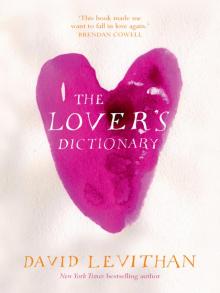 The Lover's Dictionary
The Lover's Dictionary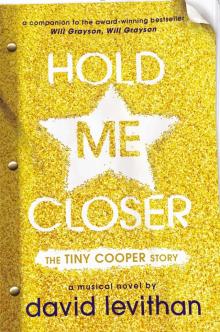 Hold Me Closer: The Tiny Cooper Story
Hold Me Closer: The Tiny Cooper Story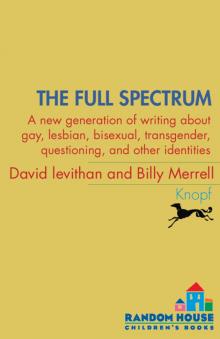 The Full Spectrum
The Full Spectrum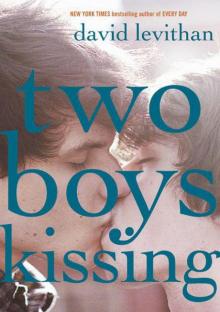 Two Boys Kissing
Two Boys Kissing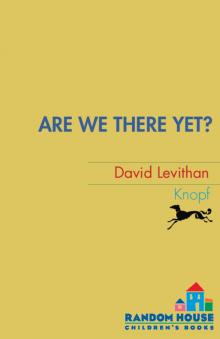 Are We There Yet?
Are We There Yet?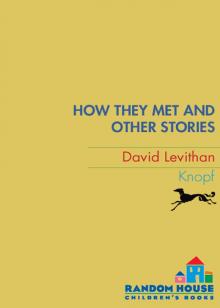 How They Met and Other Stories
How They Met and Other Stories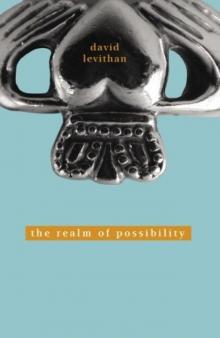 The Realm of Possibility
The Realm of Possibility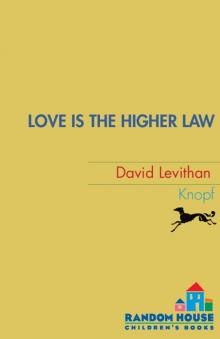 Love Is the Higher Law
Love Is the Higher Law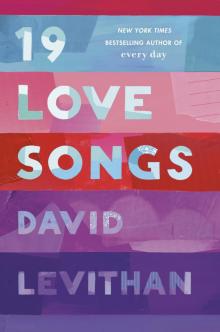 19 Love Songs
19 Love Songs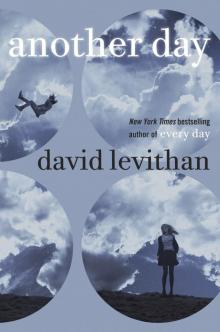 Another Day
Another Day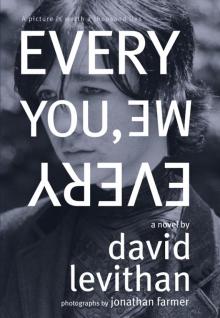 Every You, Every Me
Every You, Every Me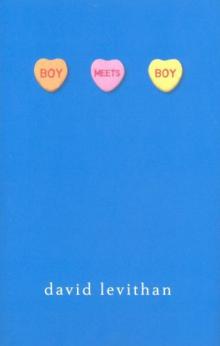 Boy Meets Boy
Boy Meets Boy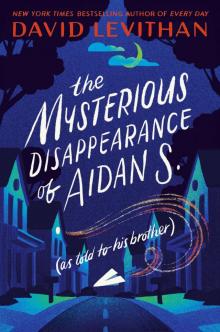 The Mysterious Disappearance of Aidan S. (as told to his brother)
The Mysterious Disappearance of Aidan S. (as told to his brother)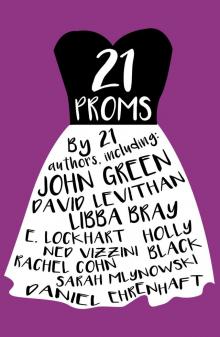 21 Proms
21 Proms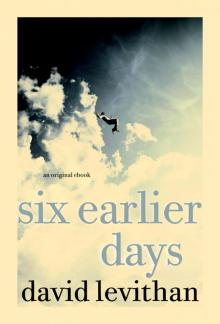 Six Earlier Days
Six Earlier Days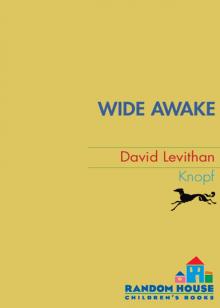 Wide Awake
Wide Awake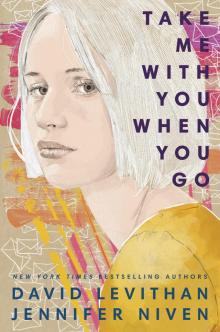 Take Me With You When You Go
Take Me With You When You Go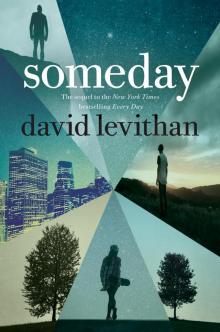 Someday
Someday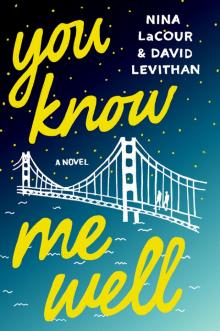 You Know Me Well
You Know Me Well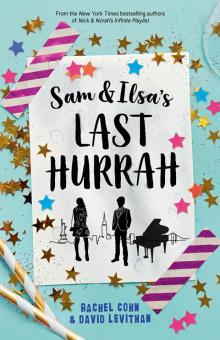 Sam and Ilsa's Last Hurrah
Sam and Ilsa's Last Hurrah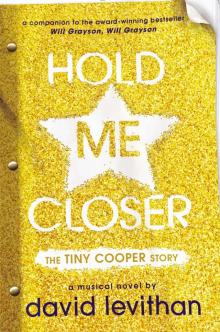 Hold Me Closer
Hold Me Closer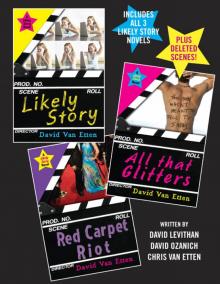 Likely Story!
Likely Story!